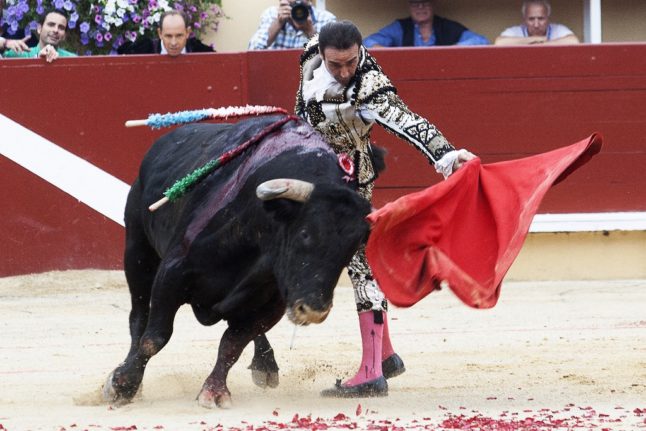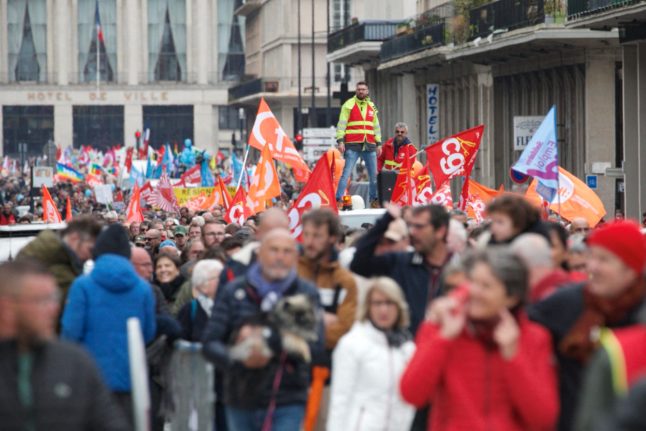Around one million people visit the Bayonne Festival in southern France – it is an event which features everything from live music and parades to games for children and fireworks.
The festival kicks off on Wednesday, July 26th and runs until Sunday. Over the five days, hundreds of thousands of revellers will head to Bayonne, close to the Spanish border, to enjoy what is dubbed France’s wildest party.
Each day will be jam packed with activities including parades of illuminated floats, traditional songs and dances, food and drink stalls in every direction and music concerts.
At night, festival goers are known to dance, spin, and often stumble from peñas to peñas (neighbourhood clubs) in a sea of sound and movement that lasts until the early hours of the morning.
But the festival also features one activity that means many will never set foot in Bayonne during the event – la corrida (bullfighting).
Usually associated with Spain, bullfighting also takes place in southern France, especially in the Basque country of the south west, although in recent years more and more towns have abandoned their bullfighting festivals after strong opposition.
There have also been repeated attempts to ban the practice in France on animal welfare grounds, but none have succeeded.
The Fêtes de Bayonne has a strong Basque identity, and bullfighting is a traditional part of the event. This programme features two corridas – a horseback event and a bullfight featuring a father-and-son team from Spain.
Manual widget for ML (class=”ml-manual-widget-container”)
And it’s for this reason that many people boycott the event.
The French group CRAC Europe (The Radical Committee Against Corrida) is among the leading voices against bullfighting, however the group would not support a boycott of Bayonne festival, just the corrida itself.
“Bullfighting in general is perverse, it’s sadism, and it’s incredible that in the 21st century there is still entertainment based on stabbing animals to death,” the group’s vice president, Roger Lahana, told The Local previously.
“In Bayonne they have nice parties, and we have nothing against people who want to have fun, drink, dance, and listen to music. But festivals don’t need bullfights,” he said.
CRAC’s Lahana points out that at a festival in Mont-de-Marsan there were 100,000 people on the street partying while just 7,000 attended the bullfight.
“You can do the maths, people will still go to festivals without bullfights, and festivals are going to continue even if bullfights were to disappear,” he said.
But Fête de Bayonne organiser Olivier Baratchart said that they’re looking forward to hosting bullfighting events this year, telling local paper Ouest France: “Juan Manuel and his family are delighted to come and we are delighted to welcome them. The pillars of this campo are a father and son, veterinarians by profession. The son has high hopes for the Bayonne bullfight. I think it will go well.
“We’d like to continue writing the history of our bullring with them.”
Xabi Belain of Bayonne’s tourist office told The Local that people who wanted to come to the festival shouldn’t let the bullfights stop them.
“Bullfighting is a tradition in France,” he said.
“We understand that it is complicated for some people, but this is a strong tradition, especially in Bayonne which was the first place in France to host bullfighting.
“But the bullfighting is one of the smallest parts of the festival. One million people come for a whole host of activities – it’s a huge party – and the bullfighting arena only fits 10,000 people.”
He said that those who come for the bullfights are a “small but devoted” group, many of whom come to see some of the world’s best bullfighters perform.
And for those who are against bullfighting, he had a simple message: “For those people who don’t want to see the bullfighting – we understand – but you don’t need to boycott the festival.”
You can find full details of the festival – which costs €12 for a weekend pass – and the complete programme of events here.




 Please whitelist us to continue reading.
Please whitelist us to continue reading.
We human beings still display and act out the savagery that is part of our inherited genes. The continuance of public torture and killing for entertainment purposes is proof of our atavistic nature. Culturally we are slowly changing, in Roman times it was people not bulls – oh but wait, what about ISIS? As a primary species, is the awesome destructive power of thermal nuclear weapons really in safe hands? I think not, but perhaps with luck we’ll make it through.